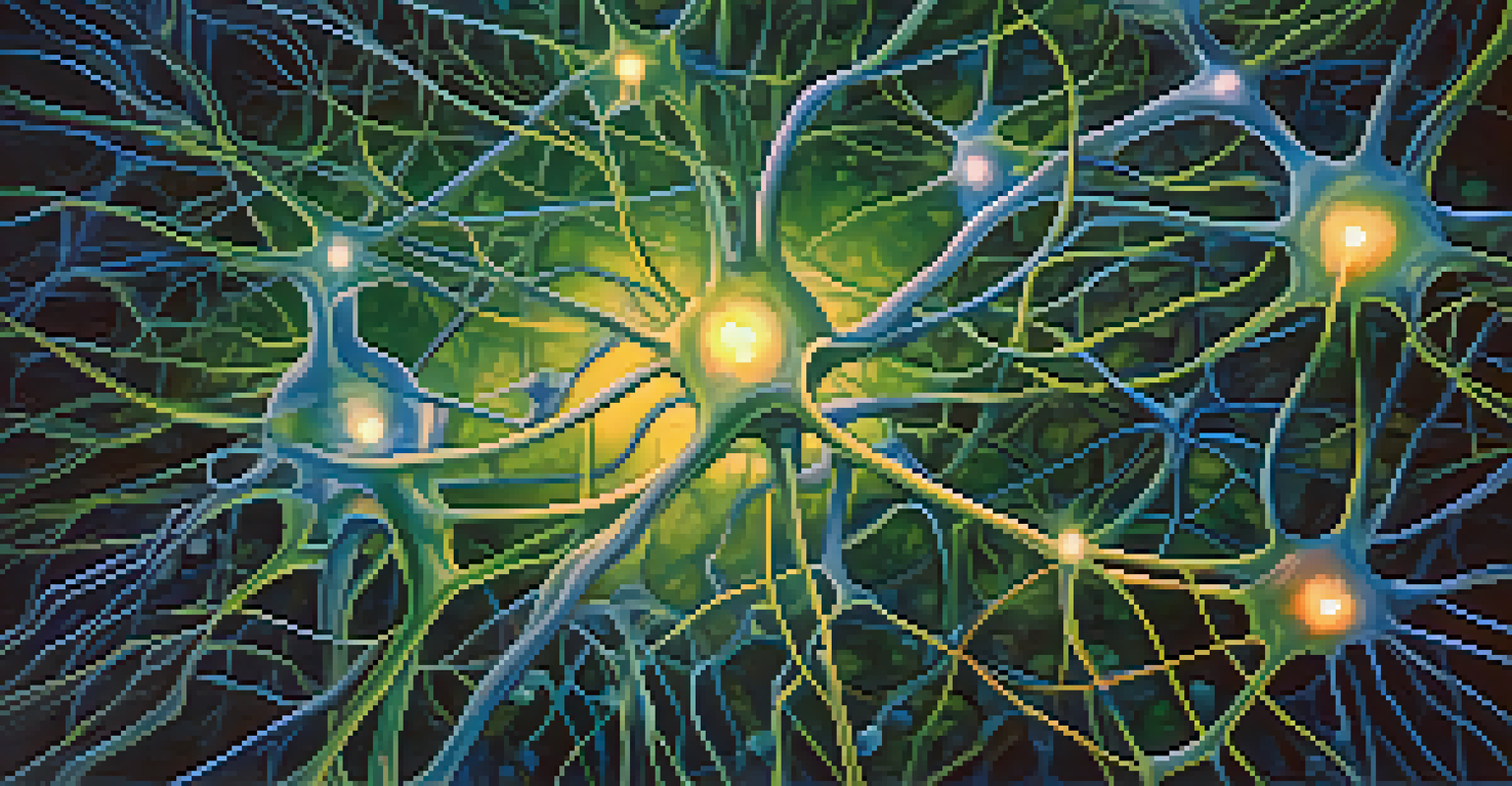The Role of Neurotransmitters in Hallucinogen Experiences

What Are Neurotransmitters and Their Functions?
Neurotransmitters are chemical messengers in the brain that facilitate communication between neurons. They play a crucial role in regulating various bodily functions, including mood, memory, and perception. Understanding their functions helps clarify how substances like hallucinogens can alter our experiences.
The mind is everything. What you think you become.
For example, dopamine is often associated with pleasure and reward, while serotonin affects mood and perception. These neurotransmitters can significantly influence how we experience reality, especially under the influence of hallucinogenic substances. In essence, they shape our emotional and sensory responses to the world around us.
By grasping the roles of these neurotransmitters, we can better appreciate the profound impact hallucinogens have on our mental state. This understanding paves the way for exploring how these chemicals interact with hallucinogens during such experiences.
How Hallucinogens Interact with Neurotransmitters
Hallucinogens, such as LSD and psilocybin, primarily affect serotonin receptors in the brain. These substances mimic serotonin, leading to altered sensory perceptions and emotional responses. This interaction is what often results in the vivid hallucinations and profound changes in consciousness that users report.

For instance, when hallucinogens bind to serotonin receptors, they can enhance sensory input, making colors appear brighter and sounds more intense. This heightened state of awareness can create a feeling of interconnectedness with the universe, often described in mystical terms. Understanding this mechanism gives insight into why these substances are capable of inducing such transformative experiences.
Neurotransmitters Shape Experiences
Neurotransmitters like serotonin and dopamine play a crucial role in influencing mood, perception, and the overall hallucinogenic experience.
Moreover, the way these drugs influence neurotransmitter systems may also explain the therapeutic potential of hallucinogens in treating mental health disorders. As we explore these interactions, we can see the fine line between pleasure and perception in our experiences.
The Role of Serotonin in Hallucinogenic Experiences
Serotonin, often dubbed the 'feel-good' neurotransmitter, plays a pivotal role in shaping hallucinogenic experiences. When hallucinogens interact with serotonin receptors, they can lead to altered states of consciousness, enhancing emotional and sensory perceptions. This shift can create feelings of euphoria, as well as anxiety or fear, depending on the individual and context.
Psychedelics can help us look at the world in a new way, and can help us understand the mind and consciousness.
For example, many users report experiencing a sense of unity with their surroundings, which can be attributed to serotonin's effects on mood and perception. This can manifest in profound feelings of connection or even spiritual experiences. Understanding serotonin's influence helps us appreciate the diversity of experiences individuals may have while under the influence of hallucinogens.
Furthermore, the balancing act of serotonin levels can lead to varying reactions among users. While some may find peace and clarity, others may encounter confusion or distress, highlighting the complex interplay between neurotransmitters and individual psychology.
Dopamine's Influence on Reward and Hallucinations
Dopamine is another key neurotransmitter that significantly influences our experiences with hallucinogens. Often associated with the brain's reward system, dopamine can enhance feelings of pleasure and motivation. When hallucinogens increase dopamine levels, users may experience heightened enjoyment and altered perceptions of reality.
This can explain why certain hallucinogenic experiences are described as euphoric or enlightening. For instance, users might feel a rush of joy or a sense of accomplishment during their trip, as dopamine reinforces positive feelings. This connection between dopamine and reward can lead to a deeper exploration of one's consciousness.
Psychological Context Matters
The individual mindset and environment significantly impact how someone reacts to hallucinogens, demonstrating the importance of 'set and setting.'
However, the relationship isn’t always straightforward. Excessive dopamine release can sometimes result in paranoia or anxiety, illustrating the delicate balance required for a positive hallucinogenic experience. Understanding how dopamine interacts with hallucinogens provides valuable insights into the range of effects these substances can have.
The Impact of Glutamate on Perception During Trips
Glutamate, the primary excitatory neurotransmitter in the brain, also plays a crucial role in the hallucinogenic experience. It is responsible for stimulating neural pathways and is essential for learning and memory. When hallucinogens affect glutamate activity, they can lead to altered perceptions of reality and a sense of disconnection from one's surroundings.
For example, users may experience synesthesia, where they can 'see' sounds or 'hear' colors. This fascinating phenomenon is linked to the way glutamate enhances sensory processing in the brain. The interplay of glutamate with other neurotransmitters can create a rich tapestry of experiences that feel both surreal and vivid.
Moreover, understanding glutamate's role in hallucinogenic experiences sheds light on the potential therapeutic uses of these substances. By modulating glutamate activity, researchers are exploring new avenues for treating conditions like PTSD and depression, demonstrating the profound impact of neurotransmitters on our experiences.
The Psychological Factors Influencing Hallucinogenic Trips
While neurotransmitters play a key role in hallucinogenic experiences, psychological factors also significantly influence the outcomes. Individual mindsets, past experiences, and the environment can shape how someone reacts to hallucinogens. This phenomenon is often referred to as 'set and setting.'
For instance, a person in a positive, supportive environment may have a more enjoyable experience than someone in a chaotic or stressful setting. The interplay between neurotransmitter activity and psychological factors creates a unique landscape for each user's journey. A calm mindset can enhance feelings of joy and connection, while anxiety can lead to challenging experiences.
Therapeutic Uses of Hallucinogens
Research indicates that hallucinogens may offer therapeutic benefits for mental health conditions by modulating neurotransmitter systems.
Thus, understanding the psychological context is just as important as exploring the biochemical interactions. It highlights the complexity of hallucinogenic experiences, suggesting that both mind and body play crucial roles in shaping our perceptions.
Therapeutic Potential of Hallucinogens and Neurotransmitters
Recent research has highlighted the therapeutic potential of hallucinogens in treating various mental health conditions, such as depression and anxiety. This is largely due to their ability to modulate neurotransmitter systems, offering new pathways for healing. By targeting serotonin and other neurotransmitters, hallucinogens can foster significant emotional breakthroughs.
For example, patients undergoing guided therapy sessions with psychedelics often report profound insights and emotional releases, suggesting that these substances can unlock deeper mental processes. The interactions between hallucinogens and neurotransmitters create a unique opportunity for transformative experiences that traditional therapies may not provide.

As this field of study continues to grow, we can expect to learn more about how neurotransmitter dynamics influence therapeutic outcomes. This understanding could lead to more effective treatments that harness the power of our brain's chemistry to promote healing and personal growth.